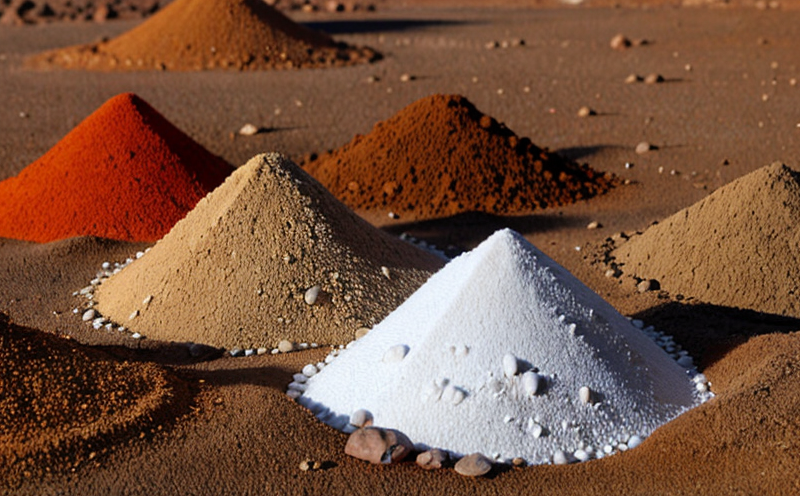ISO 21079 Determination of Uranium and Thorium in Rare Earths Testing
The determination of uranium (U) and thorium (Th) is a critical step in the quality assurance process for rare earth element (REE) testing. This service is essential for ensuring compliance with international standards, supporting scientific research, and enhancing product purity, which are vital for industries ranging from metallurgy to environmental monitoring.
The ISO 21079 standard specifies a method using X-ray fluorescence spectrometry (XRF), an analytical technique that can accurately measure trace amounts of U and Th in REEs. This service is particularly important because the presence of these elements can significantly influence the chemical, physical, and even radioactive properties of rare earth compounds.
The process involves several key steps: sample preparation, which includes crushing, sieving, and homogenization to ensure consistency; digestion using strong acids like nitric acid to release U and Th from their mineral matrices; and subsequent analysis by XRF. The method is sensitive enough to detect trace levels of these elements down to the parts per million (ppm) range.
The significance of this service extends beyond mere compliance with standards. It also contributes to environmental sustainability by ensuring that waste streams are not contaminated, thereby reducing potential risks to ecosystems and human health. Additionally, accurate determination of U and Th content is crucial for the development of advanced alloys and catalysts in the aerospace and automotive sectors.
Quality assurance is paramount in this service, as even small variations in U and Th content can lead to significant deviations in product performance. Our laboratory adheres strictly to ISO 21079 guidelines and uses state-of-the-art equipment to ensure precision and reliability. This commitment to accuracy and consistency ensures that clients receive reliable data that they can trust.
The results from this testing are used by quality managers, compliance officers, R&D engineers, and procurement teams to make informed decisions about the purity of their materials. By adhering to ISO 21079 standards, these professionals ensure that their products meet international requirements and industry best practices.
- Sample preparation: Crushing, sieving, and homogenization
- Digestion with strong acids like nitric acid
- Analysis by X-ray fluorescence spectrometry (XRF)
- Trace detection down to parts per million (ppm)
The expertise in this service is supported by rigorous adherence to ISO 21079 standards and the use of advanced instrumentation. This ensures that every test result is accurate, reliable, and compliant with international regulations.
In conclusion, the determination of uranium and thorium in rare earths testing is not just a technical process; it is a cornerstone of quality assurance. By adhering to ISO 21079 guidelines, our laboratory provides clients with the confidence they need to make informed decisions about their materials.
Why It Matters
The accurate determination of uranium (U) and thorium (Th) in rare earth elements (REEs) is crucial for several reasons. Firstly, it ensures compliance with international standards such as ISO 21079, which are essential for the quality assurance of REEs used in various industries.
Secondly, this service supports scientific research by providing reliable data that can be used to understand the behavior and properties of U and Th in REE compounds. This knowledge is vital for the development of new technologies and materials.
Thirdly, accurate determination of these elements enhances product purity, which is critical for industries such as metallurgy and environmental monitoring. High levels of impurities can lead to reduced performance or even safety hazards, making this service indispensable.
The presence of U and Th in REEs also has significant implications for the environment. Ensuring that waste streams are not contaminated by these elements helps reduce potential risks to ecosystems and human health. This is particularly important in light of growing concerns about environmental sustainability.
Finally, accurate testing of U and Th content is crucial for the development of advanced alloys and catalysts used in sectors such as aerospace and automotive. The precise control of these elements can lead to improvements in product performance, efficiency, and longevity.
Benefits
The benefits of adhering to ISO 21079 standards for the determination of uranium (U) and thorium (Th) in rare earths are manifold. Firstly, it ensures compliance with international regulations, which is essential for maintaining a high standard of quality assurance.
Secondly, this service supports scientific research by providing reliable data that can be used to understand the behavior and properties of U and Th in REE compounds. This knowledge is vital for the development of new technologies and materials.
Thirdly, accurate determination of these elements enhances product purity, which is critical for industries such as metallurgy and environmental monitoring. High levels of impurities can lead to reduced performance or even safety hazards, making this service indispensable.
The presence of U and Th in REEs also has significant implications for the environment. Ensuring that waste streams are not contaminated by these elements helps reduce potential risks to ecosystems and human health. This is particularly important in light of growing concerns about environmental sustainability.
Finally, accurate testing of U and Th content is crucial for the development of advanced alloys and catalysts used in sectors such as aerospace and automotive. The precise control of these elements can lead to improvements in product performance, efficiency, and longevity.
Quality and Reliability Assurance
The quality and reliability of the ISO 21079 determination of uranium and thorium in rare earths testing are paramount for ensuring accuracy and compliance with international standards. Our laboratory adheres strictly to ISO 21079 guidelines, which specify a rigorous process from sample preparation through analysis.
- Sample preparation: Crushing, sieving, and homogenization
- Digestion with strong acids like nitric acid
- Analysis by X-ray fluorescence spectrometry (XRF)
- Trace detection down to parts per million (ppm)
The use of advanced instrumentation ensures that every test result is accurate, reliable, and compliant with international regulations. Our commitment to precision and consistency provides clients with the confidence they need in their materials.





